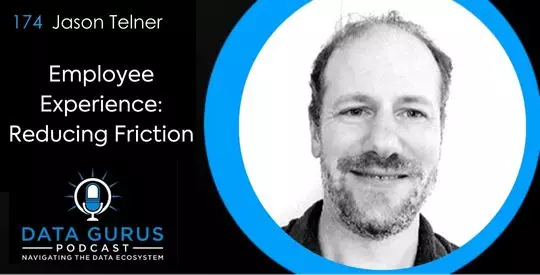Podcast: Play in new window | Download
Welcome to another informative episode of Data Gurus! Sima is excited to have Jason Telner join her on the show today!
Jason is a Senior User Researcher within the CIO organization at IBM. His primary purpose is to use various methods to improve the employees’ experience with the apps and tools they use and improve their overall workflow and work experiences.
Improving the lives of employees
Jason’s role at IBM focuses on improving the employees’ lives in terms of their day-to-day productivity, how they relate to the company and the tools they provide. He does that using surveys, user interviews, and collecting data to see how that can improve the design of their entire experience.
A unified experience
At IBM, they feel that having a unified experience benefits the employees, and the company’s response to things in the environment, like Covid or global crises. They have a website for employees to find information, figure things out around their careers, and have a more unified experience.
Jason’s journey
As an undergrad, Jason focused on neuroscience and cognitive behavior. He wanted to apply the theories he had learned, in terms of how people think, feel, and perceive information to everyday world problems. He considered industrial psychology and did an internship withHuman Systems, a company focused on optimizing human performance using military equipment, command and control, and transportation. Then he got involved in human factors, studied it in grad school, and worked on various projects around redesigning displays for traffic controllers- looking at night vision goggles and different perceptual distortions causing accidents.
Later, Jason applied his skills to the digital age of the internet and the user experience.
IBM
Jason has been with IBM for eight years. He has spent much of his time within the CIO, working on employee engagement and the day-to-day workflow of the employees.
Interesting projects
Jason has been working on some exciting projects at IBM. With one of them, they are trying to assess whether or not various project teams have the right capabilities and attitudes regarding user experience.
An assessment tool
Jason and his team created an assessment tool to help teams figure out the strengths and weaknesses of the project teams, pinpoint how they can improve, and recommend the training to equip them to do user research and user experience design.
Agile teams
Teams need to work in an agile way in terms of designing applications and software.
User research
User experience research is becoming vital to the overall product, so it must be injected into a design project early. Teams realize that if the user research gets done too late, it is hard to pull back.
Creating a digital assistant
Another project Jason is working on is creating a digital assistant to help employees in various realms with IT support and answer employee-related questions. They are building it on the information they get from doing user research and data.
IBM cares about its employees
IBM cares about its employees in various ways. It does that through its phone and online IT support and how they work when big crises, like Covid, happen.
UX and data science trends
Data science is a hot area. The areas of data science and user experience research are becoming increasingly more integrated as time passes because data does not always give the whole story. Data science and user experience research complement one another, so using them together will help to prevent blind spots.
The great resignation
The great resignation has made it easier for employees to find new opportunities.
Covid
Before Covid, many employees in the IT sector were already working remotely. Since Covid, many of those employees have switched roles and gotten recruited by companies outside their regions.
Working in-office versus working remotely
Younger people starting their careers are less likely to opt for working remotely because they prefer the face-to-face experience of working in-office. People with families, however, tend to prefer having the flexibility of working remotely.
The future
Jason sees his team moving towards more integrated skills, like data science and UX working together in tandem, in the future. He also sees more integrated work and multi-disciplinary teams working on all the products they do.
Links:
Email me your thoughts!
Sima@Infinity-2.com
Connect with Jason




